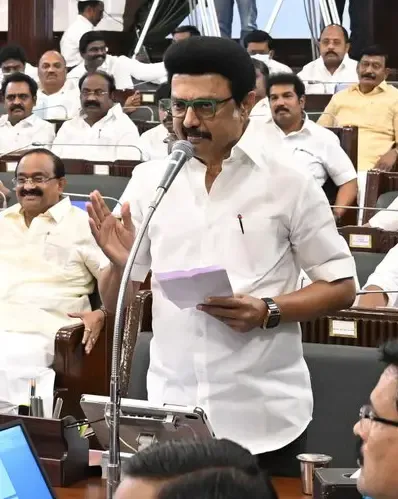Supreme Court Ruling Against TN Governor: A Key Victory for State Sovereignty, Says CM Stalin

Synopsis
Key Takeaways
- Supreme Court rules against Governor R.N. Ravi.
- Affirms Tamil Nadu's legislative autonomy.
- Governor's inaction deemed illegal.
- Internal SC reservations upheld.
- Strengthens federalism and social justice.
Chennai, April 8 (NationPress) Chief Minister M.K. Stalin praised the Supreme Court's decision against Governor R.N. Ravi as a monumental triumph for Tamil Nadu and for all state governments throughout India.
Addressing the Tamil Nadu Legislative Assembly, CM Stalin remarked that the ruling validated the state's position on legislative independence.
The case revolved around a conflict concerning multiple bills passed by the Tamil Nadu Assembly, which the Governor withheld for assent. On Tuesday, the Supreme Court declared that the Governor's decision to reserve 10 re-adopted bills for the President's review was unlawful and incorrect.
The bench, including Justices J.B. Pardiwala and R. Mahadevan, emphasized that once the Assembly re-passed the bills and submitted them again to the Governor, he was constitutionally obligated to provide assent and could not reserve them for the President unless there were significant discrepancies between the original and re-adopted drafts.
The court pointed out that the Governor did not fulfill his duties in good faith and concluded that the bills should be considered as having received assent on the day they were re-submitted. The bench clarified that under Article 200 of the Constitution, the Governor lacks the discretionary authority to withhold assent and must act according to the recommendations of the Chief Minister and the Council of Ministers.
CM Stalin stated, “This ruling fortifies Tamil Nadu’s quest for autonomy and bolsters the Dravidian model, which champions the values of federalism and state self-rule.”
In a related ruling, the Supreme Court also supported internal reservations within the Scheduled Caste quota in Tamil Nadu, which CM Stalin referred to as another important endorsement of the state’s progressive initiatives.
The court sanctioned a 3 percent internal reservation for the Arundhatiyar community within the existing 18 percent SC quota, which the Chief Minister labeled a victory for social equity.
The Tamil Nadu government had previously lodged a writ petition in the Supreme Court, accusing Governor R.N. Ravi of behaving like a political opponent by returning 10 out of 12 bills and delaying assent without legitimate reasons.
During the hearings, the court scrutinized the Governor’s extended inaction and noted that the bills had lingered since January 2020. It pointedly questioned why the Governor delayed action until the case reached the court.
The bench also rebuked the Governor for his lack of communication regarding any constitutional issues he might have had with the bills. “If there was a concern regarding repugnancy, it should have been immediately conveyed to the state government. How is the Assembly expected to discern the Governor’s thoughts?” the court inquired.









